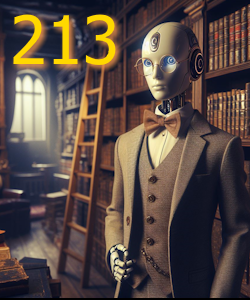Sztuczna inteligencja i prawdziwe biblioteki: szok przyszłości i co dalej?
Abstract
Abstract: In this article we consider the situation of several areas of library practice susceptible to being taken over by artificial intelligence tools. However, we reject visions of profound change associated with this, not believing in the extent or sustainability of the shift, since new technologies do not generally eliminate old ones or give a sense of having to 'switch' to them altogether. Nor are we able to give credence to predictions that such a change could be socially conscious and conducted towards profound results. We believe that progress in libraries, social communication and the circulation of scientific information has not in recent decades been the result of a coherent policy, but depended on a number of random factors; change has generally led nowhere, and school leavers at all levels are not prepared to benefit from new opportunities to orient themselves in the world and acquire knowledge. However, we list a few areas where the presence of artificial intelligence in libraries is already yielding results, and we allow ourselves to speculate on what its future directions may yet be. Successful implementations could significantly transform the mode of library use and change the nature of libraries to a greater extent than the computerisation that began in the decline of the last century.
References
BARON, N.S. (2023). Who wrote this? How AI and the lure of efficiency threaten human writing. Stanford: Stanford University Press.
BOROWSKA, K. (2023). Obliczenia granularne w przetwarzaniu danych niezbalansowanych [Rozprawa doktorska, Politechnika Białostocka] [online]. Białystok. [Dostęp 18.03.2024]. Dostępny w: https://bazawiedzy.pb.edu.pl/info/phd/BUTda295628a9c9455ebcaa68335ab5c713.
CHOMSKY, N. (2023). The false promise of Chat GPT. The New York Times [online]. 08.03. [Dostęp 18.03.2024]. Dostępny w: https://www.nytimes.com/2023/03/08/opinion/noam-chomsky-chatgpt-ai.html.
CRONIN, J. (2024). Noam Chomsky On Artificial Intelligence. A ChatGPT Rebuttal. W: LinkedIn [online]. 24.01. [Dostęp 18.03.2024]. Dostępny w: https://www.linkedin.com/pulse/noam-chomsky-artificial-intelligence-chaptgpt-rebuttal-jon-cronin-7rzie/.
DUKAJ, J. (2023). Się pisze. Książki : Magazyn do Czytania, nr 4, s. 12–19.
ENIS, M. (2021). OverDrive refines readtelligence, a new AI-driven collection management tool. Library Journal [online]. Oct. 07. [Dostęp 30.01.2024]. Dostępny w: https://www.libraryjournal.com/story/overdrive-refines-readtelligence-a-new-ai-driven-collection-management-tool.
FRANKE, J. (2024). OMNIS 2 i pół. Karawana jedzie dalej. Materiał niepublikowany.
GOLUB, K. (2021). Automated subject indexing: an overview. Cataloging and Classification Quarterly [online]. Nr 8, s. 702–719. [Dostęp 13.03.2024). Dostępny w: https://doi.org/10.1080/01639374.2021.2012311.
HOLLENDER, H. (2021). Cyfrowe wzmożenie w zbiorach specjalnych. W: Puchalski, J. (red.). Książki mają swoją historię: studia ofiarowane Profesor Barbarze Bieńkowskiej. Warszawa: Wydaw. SBP, s. 410–446.
JANICKA, E. (2017). O kontrkulturę – tu i teraz. Wystąpienie na Nadzwyczajnym Zjeździe Etnologów i Antropologów Polskich „Antropologia przeciw dyskryminacji”. Lud [online]. Nr 101, s. 93–95. [Dostęp 18.03.2024]. Dostępny w: https://apcz.umk.pl/LUD/article/view/lud101.2017.01d.
KRUEGER, A. (2024). Why the Russia sanctions are failing. Project Syndicate [online]. Jan. 18. [Dostęp 30.01.2024] . Dostępny w: https://www.project-syndicate.org/commentary/how-russia-circumvented-western-sanctions-by-anne-o-krueger-2024-01.
LEE, J. Y. (2023). Can an artificial intelligence chatbot be the author of a scholarly article? Journal of Educational Evaluation for Health Professionals [online]. Nr 6. [Dostęp 18.03.2024). Dostępny w: https://doi.org/10.3352/jeehp.2023.20.6.
MYKOWIECKA, A. (2007). Inżynieria lingwistyczna: komputerowe przetwarzanie tekstów w języku naturalnym. Warszawa: Wydaw. Polsko-Japońskiej Wyższej Szkoły Technik Komputerowych. (Podręczniki akademickie, t. 27).
OYELUDE, A. (2021). AI and libraries: trends and projections. Library Hi Tech News [online]. R. 38, nr 10, s. 1-4. [Dostęp 30.01.2024]. Dostępny w: https://doi.org/10.1108/LHTN-10-2021-0079 .
OŚWIADCZENIE (2023). Oświadczenie CEATL w sprawie wykorzystania sztucznej inteligencji [online]. Stowarzyszenie Tłumaczy Literatury. Aktualności. [Dostęp 13.03.2024.] Dostępny w: https://stl.org.pl/oswiadczenie-ceatl-w-sprawie-wykorzystania-sztucznej-inteligencji/.
ROTKIEWICZ, M. (2024). Więcej czatu! Jak sztuczna inteligencja wspomaga badaczy. Polityka, nr 17 (3461), 14.04-23.04, s. 56-58.
SAMPLE, I. (2023), Science journals ban listing of ChatGPT as co-author on papers. The Guardian [online]. [Dostęp 18.03.2024]. Dostępny w: https://www.theguardian.com/science/2023/jan/26/science-journals-ban-listing-of-chatgpt-as-co-author-on-papers.
SÜHL-STROHMENGER, W., TAPPENBECK, I. (red.) (2024). Praxishandbuch Wissentschaftliche Bibliothekar: innen. Wandel von Handlungsfeldern, Rollen und Perspektiven im Kontext der digitalen Transfromation [online]. Berlin: De Gruyter, Saur. [Dostęp 18.03.2024]. Dostępny w: https://doi.org/10.1515/9783110790375.
SZOT, W. (2023). Literatura, czyli małż. Magazyn Gazety Wyborczej, 29-30 lipca, s. 12-13.
TANZI, N. (2023). How can AI be used in libraries? The Digital Librarian [online]. Jan. 23. [Dostęp 18.03.2024]. Dostępny w: https://the-digital-librarian.com/2023/01/23/artificial-intelligence-in-the-library/.
THORP, H. (2023). ChatGPT is fun, but not an author. Editorial. Science [online]. R. 379, nr 6630, s. 313. [Dostęp 13.03.2024]. Dostępny w: https://www.science.org/doi/10.1126/science.adg7879.
TOFFLER, A. (1974). Szok przyszłości. Przeł. W. Osiatyński, E. Grabczak-Ryszka, E. Woydyłło. Warszawa: Państwowy Instytut Wydawniczy.
TOKARSKA, A. (red.) (2013). Bibliotekarstwo. Warszawa: Wydaw. SBP.
WHEATLEY, A., HERVIEUX, S. (2019). Artificial intelligence in academic libraries: an environmental scan. Information Services & Use [online]. R. 39, nr 4, s. 347-356. [Dostęp 18.03.2023]. Dostępny w: http://dx.doi.org/10.3233/ISU-190065.

This work is licensed under a Creative Commons Attribution 4.0 International License.

